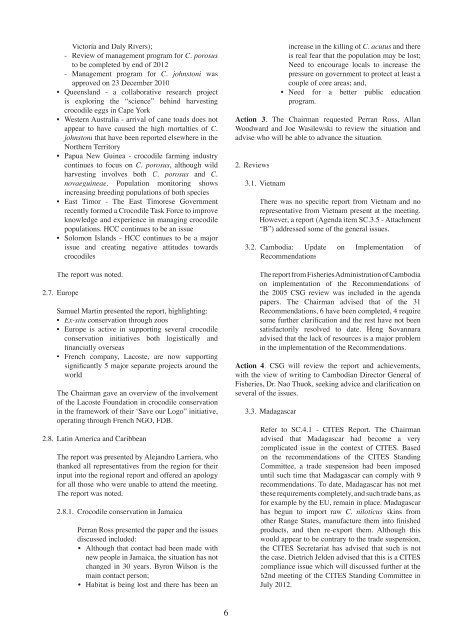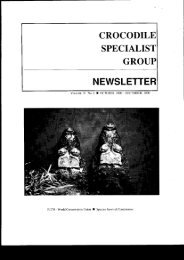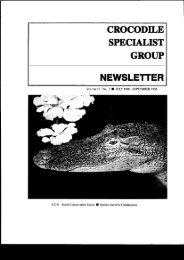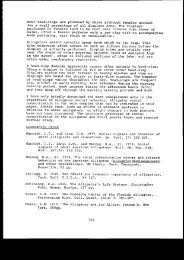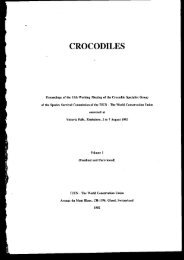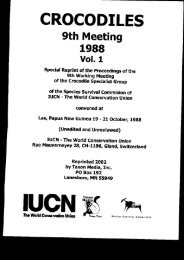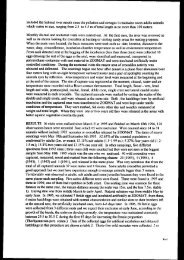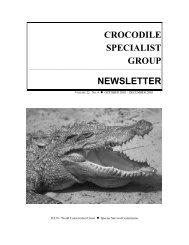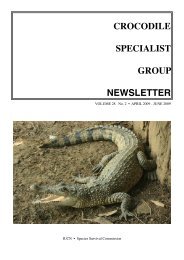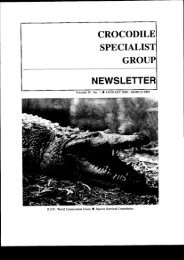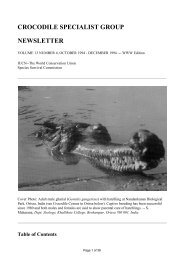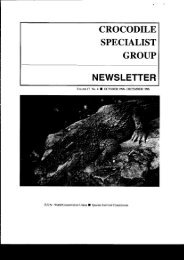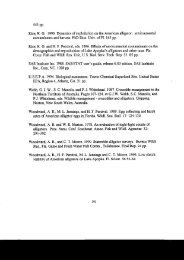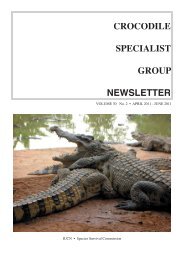CROCODILE SPECIALIST GROUP NEWSLETTER
CROCODILE SPECIALIST GROUP NEWSLETTER
CROCODILE SPECIALIST GROUP NEWSLETTER
You also want an ePaper? Increase the reach of your titles
YUMPU automatically turns print PDFs into web optimized ePapers that Google loves.
Victoria and Daly Rivers);<br />
- Review of management program for C. porosus<br />
to be completed by end of 2012<br />
- Management program for C. johnstoni was<br />
approved on 23 December 2010<br />
• Queensland - a collaborative research project<br />
is exploring the “science” behind harvesting<br />
crocodile eggs in Cape York<br />
• Western Australia - arrival of cane toads does not<br />
appear to have caused the high mortalties of C.<br />
johnstoni that have been reported elsewhere in the<br />
Northern Territory<br />
• Papua New Guinea - crocodile farming industry<br />
continues to focus on C. porosus, although wild<br />
harvesting involves both C. porosus and C.<br />
novaeguineae. Population monitoring shows<br />
increasing breeding populations of both species<br />
• East Timor - The East Timorese Government<br />
recently formed a Crocodile Task Force to improve<br />
knowledge and experience in managing crocodile<br />
populations. HCC continues to be an issue<br />
• Solomon Islands - HCC continues to be a major<br />
issue and creating negative attitudes towards<br />
crocodiles<br />
The report was noted.<br />
2.7. Europe<br />
Samuel Martin presented the report, highlighting:<br />
• Ex-situ conservation through zoos<br />
• Europe is active in supporting several crocodile<br />
conservation initiatives both logistically and<br />
financially overseas<br />
• French company, Lacoste, are now supporting<br />
significantly 5 major separate projects around the<br />
world<br />
The Chairman gave an overview of the involvement<br />
of the Lacoste Foundation in crocodile conservation<br />
in the framework of their ‘Save our Logo” initiative,<br />
operating through French NGO, FDB.<br />
2.8. Latin America and Caribbean<br />
The report was presented by Alejandro Larriera, who<br />
thanked all representatives from the region for their<br />
input into the regional report and offered an apology<br />
for all those who were unable to attend the meeting.<br />
The report was noted.<br />
2.8.1. Crocodile conservation in Jamaica<br />
Perran Ross presented the paper and the issues<br />
discussed included:<br />
• Although that contact had been made with<br />
new people in Jamaica, the situation has not<br />
changed in 30 years. Byron Wilson is the<br />
main contact person;<br />
• Habitat is being lost and there has been an<br />
increase in the killing of C. acutus and there<br />
is real fear that the population may be lost;<br />
Need to encourage locals to increase the<br />
pressure on government to protect at least a<br />
couple of core areas; and,<br />
• Need for a better public education<br />
program.<br />
Action 3. The Chairman requested Perran Ross, Allan<br />
Woodward and Joe Wasilewski to review the situation and<br />
advise who will be able to advance the situation.<br />
2. Reviews<br />
3.1. Vietnam<br />
There was no specific report from Vietnam and no<br />
representative from Vietnam present at the meeting.<br />
However, a report (Agenda item SC.3.5 - Attachment<br />
“B”) addressed some of the general issues.<br />
3.2. Cambodia: Update on Implementation of<br />
Recommendations<br />
The report from Fisheries Administration of Cambodia<br />
on implementation of the Recommendations of<br />
the 2005 CSG review was included in the agenda<br />
papers. The Chairman advised that of the 31<br />
Recommendations, 6 have been completed, 4 require<br />
some further clarification and the rest have not been<br />
satisfactorily resolved to date. Heng Sovannara<br />
advised that the lack of resources is a major problem<br />
in the implementation of the Recommendations.<br />
Action 4. CSG will review the report and achievements,<br />
with the view of writing to Cambodian Director General of<br />
Fisheries, Dr. Nao Thuok, seeking advice and clarification on<br />
several of the issues.<br />
3.3. Madagascar<br />
Refer to SC.4.1 - CITES Report. The Chairman<br />
advised that Madagascar had become a very<br />
complicated issue in the context of CITES. Based<br />
on the recommendations of the CITES Standing<br />
Committee, a trade suspension had been imposed<br />
until such time that Madagascar can comply with 9<br />
recommendations. To date, Madagascar has not met<br />
these requirements completely, and such trade bans, as<br />
for example by the EU, remain in place. Madagascar<br />
has begun to import raw C. niloticus skins from<br />
other Range States, manufacture them into finished<br />
products, and then re-export them. Although this<br />
would appear to be contrary to the trade suspension,<br />
the CITES Secretariat has advised that such is not<br />
the case. Dietrich Jelden advised that this is a CITES<br />
compliance issue which will discussed further at the<br />
62nd meeting of the CITES Standing Committee in<br />
July 2012.<br />
6


